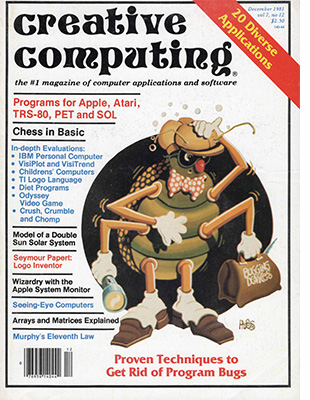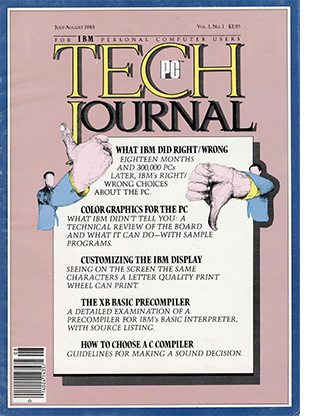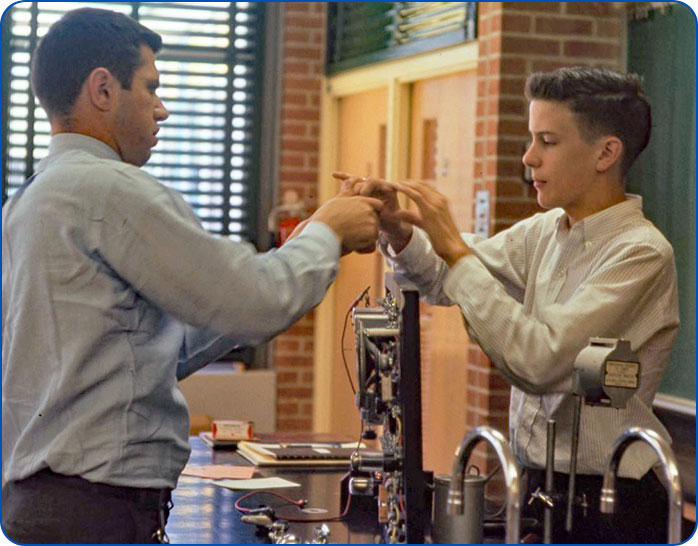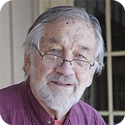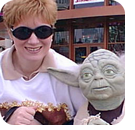|
In this issue PROFILES: Will Fastie: How to speak machine FROM THE FORUMS: An important change to our forums Additional articles in the PLUS issue • Get Plus! PUBLIC DEFENDER: Should you try USDTea technology or leaf it alone? HARDWARE: Desktop computers: Scrap, repair, upgrade, or replace? ON SECURITY: Dealing with MFA
PROFILES Will Fastie: how to speak machine
By Chris Husted This newsletter’s editor in chief is proficient in more than 16 programming languages. At many of them, he’s an expert. That’s what happens when you understand how a computer works at the most fundamental level. Of course, some of those languages are related to or derivative of other languages, such C and C++. “I call them all languages because they are languages. You must understand the syntax. You must understand what the words you are writing mean. You must understand how they are applied. It is a translation of a set of requirements into something that is actionable,” says Will. “I don’t distinguish among these very much. Most programming languages have the same degree of complexity, in my mind. And I don’t make any distinction between declarative and procedural [languages]. I just say all these languages are needed to do the work. One must be relatively fluid in six languages to do quality Web work,” he adds. Procedural languages are those that deliver the instructions for a computer to perform — such as C, C++, PHP, and JavaScript. Declarative languages are those used to provide the data or structure needed to carry out those instructions — such as CSS, JSON, XML, and HTML. “On a big project you can have specialists, but I need to be fluid in six to eight languages to get stuff done. This enables me to look at a contemporary piece of software and critique it [for positive and negative aspects],” he adds. In “getting stuff done,” Will means as a Web developer and consultant for the past 27 years as well as through his more recent collaborative work at WebDesignBuild.biz with independent graphics designer and artist Cheri Glover. “The ability for a programmer to translate what the client needs and wants into functions actually performed by the computer is critical,” says Will, drawing on his decades of experience in management and systems consulting for a range of clients, from very small businesses to Fortune 500 firms. He has been a Wall Street analyst, chief technology officer, and systems architect. “In essence, a programmer translates English into programing code to create a result. It’s as simple as: ‘Requirements — requirements analysis — coding’,” Will says, regardless of the coding language used. Throughout his career Will has programmed in over 40 languages. “The most important aspect when designing a system is meeting the requirements of the project’s stakeholders. I have the ability to see the big picture and to keep a project on track toward its goal, avoiding pitfalls. The second most important aspect is being able to analyze costs well so that stakeholders know what they are getting into.
“Listen to what the stakeholders are saying they want, and make sure you understand what they are saying — make sure there is no misunderstanding there. If you are not in sync, you can end up with something that may work but may not be extensible in a way that will be needed in the near future,” he advises. And that is where many Web builders are failing. “Usability is a huge issue,” says Will. “We’ve had decades of experience building apps for the Web and it is absolutely essential that human beings be able to use these systems — but usability still remains a problem. Will credits Ted Nelson — famous for, among other things, his quote: “Any fool can use a computer. Many do…” — for pointing out that a user interface should be so simple that a beginner in an emergency can understand it in 10 seconds. “That’s a very perceptive thought, and systems today do not meet that description at all,” Will notes. “What is so great about the Internet is its ability to store information for a very long time. The problem is poorly documented websites. People not only need access to information, they need to know how to get there,” he explains. Underpinning Will’s becoming a “language-fluid polyglot” is that same simplicity. All Will’s life he has asked: “How does that work?” From repairing his family’s cuckoo clocks to hacking into a military computer (Will served from 1968 to 1971, including two tours in Viet Nam), it was always about learning how things worked. He went on to write a machine-language program that was so effective in the classroom (Will was a data processing instructor at the time) that it reduced the time to perform a tedious task from six hours to 90 minutes. Will was a bit outside the box when he wrote the program, but when it was discovered by his superiors, he was simply asked whether it could be used in other classrooms, too. “I was amazed they asked instead of ordered, but it kept me out of the stockade,” he laughs. It was this experience that fueled Will’s fascination with computers. “I taught myself to program in machine language, and that original experience has always come in handy. I know how computers work at a very low level as a result of that. There are a lot of kids today who do not know how things work under the covers,” Will says. Back stateside, Will returned to Johns Hopkins University as an enthusiastic computer science student. Exhausting all the undergraduate courses and being blocked from taking any further graduate courses, he left university to find himself in a whirlwind of computing advancements in the private sector. “My first job, at General Instrument Corporation, was enormously exciting because we were breaking new ground every day, doing things that people thought couldn’t be done with the equipment we were using, writing very creative code, and working with enormously talented people. “I advanced quickly, became a manager, and then the director of a department. I was on several corporate-level committees as the software expert. It was a very exciting time, during which I learned a tremendous amount about computing that I would never have learned at school. The first two years in that job was like getting a master’s degree,” Will recalls. “That great period in my life sowed the seeds of my buying an IBM personal computer, and it’s what enabled me to see what was going to happen in technology,” he adds.
It was buying that IBM 5150 that saw Will enter the world of computer journalism. “I decided to try to get a job writing for Creative Computing Magazine in order to fund the purchase of the IBM PC. That was the only reason I did it. Up until that time, I did not have a computer at home, and I did not have the budget for one. I got the job, and having that PC was another great thing that happened in my career because it put computing resources at my personal disposal, on demand, and on my terms,” he notes. In true Will style, he advanced quickly. In 1983 he took up the position of founding editor in chief for the award-winning PC Tech Journal, which he still considers the best job he ever had. The writing continued with the launch of his The Fastie Report newsletter in 1989, which he sold when he became a Wall Street research analyst. In 2021, Will took up the mantle of editor in chief of this newsletter. By that time he had written over 270 published articles relating to personal computing in PC Tech Journal, PC Week, Electronic Business, PC Magazine, PCjr, Creative Computing, and others. “Calling me an editor is an oddity. I was always a better writer,” says Will. “I was very thorough when writing technical columns, and my IBM columns were very deep, which happened to make them popular. Journaling the IBM PC and its rise eventually led to my getting the PCTJ editorship.” “I did not realize I was a decent writer at first. At General Instrument, we discovered that there is a correlation between a person’s ability to write English and their ability to write code. It turns out that I was a voracious reader, which of course improves your vocabulary and helps you write better. We realized that all the best coders also wrote the best English.” Today, Will strives to reach those same standards for the newsletter through simplicity, understanding, and language. “We seek to elevate our readers’ knowledge by providing something of value that makes them want to continue to read us. That is the goal. There has got to be value,” he says.
Chris Husted, who once upon a time was a junior computer column writer, is currently Executive Editor at The Phuket News. He has spent 20 years working in news in Phuket, with a one-year hiatus as a staff editor for a small national newspaper on Borneo. FROM THE FORUMS An important change to our forums
We always look for ways to improve and grow our forums. We have been burning a lot of extra time maintaining the forums due to some customizations made years ago. The problem is that every update to the forum software wipes out the customizations, which we then need to restore manually. Besides the extra time, such a process is prone to error. One of the customizations allows forum visitors to post anonymously using a makeshift username (“anonymous”) and email address (“anonymous@askwoody.com”). Beginning on June 8, 2022, this option will no longer be available. Instead, any visitor who is not logged in must enter their name and email address before they can post or reply in the forums. We’re hoping that this will enable us to distinguish among anonymous posters. If you are a registered user or Plus member, this change will not affect you as long as you log in before posting. Anonymity
Our philosophy is that anonymity on the Web is a bad thing. At the same time, we understand that there are cases in which a participant may not wish to engage using personally identifiable information. However, using bogus information to post, including our makeshift defaults, means that one cannot fully engage in the forums. For example, someone who posted with a nonexistent email address, including “anonymous@askwoody.com,” cannot subscribe to a forum topic and receive notifications about it. The obvious solution is to register at the site, which we strongly encourage. But how can that be done while remaining as private as possible? Consider these options:
We are always looking for better ways to communicate and help users. We urge you to register so that we can follow up with questions, additional information, and clarifications — and so that you can receive forum notifications when you have subscribed to a topic.
The AskWoody Newsletters are published by AskWoody Tech LLC, Fresno, CA USA.
Your subscription:
Microsoft and Windows are registered trademarks of Microsoft Corporation. AskWoody, AskWoody.com, Windows Secrets Newsletter, WindowsSecrets.com, WinFind, Windows Gizmos, Security Baseline, Perimeter Scan, Wacky Web Week, the Windows Secrets Logo Design (W, S or road, and Star), and the slogan Everything Microsoft Forgot to Mention all are trademarks and service marks of AskWoody Tech LLC. All other marks are the trademarks or service marks of their respective owners. Copyright ©2022 AskWoody Tech LLC. All rights reserved. |
||||||||||||||||||||||||||




